Title : I’m here… #07
Location : Otsuki, Yamanashi, Japan
Date : 29th&30th/Spt./2020
Guest : Megumi Ishiwata & FUJI|||||||||||TA
At the beginning of April, around the time the state of emergency was announced, I had asked FUJI|||||||||||TA if I could interview him. I expected the interview to be online via Zoom as the circumstances prevented me from interviewing him in person during that time. However, as mentioned by him in this interview, the interview was never actualized as it was right after his performance for dommune, and he was completely worn out. It has been about half a year since then, and the public finally seems to be slightly less strained. This time I was fortunate enough to visit FUJI|||||||||||TA and his partner Megumi Ishiwata, an artist, in Otsuki, Yamanshi, where they live together, and interview them. I have visited their place several times, and thinking about going there again brought me a sense of comfort.
But in my case, I have my own studio and I was in an environment where I could make sounds everyday, so I got to do things without having to change any part of my cycle. I was just tired from the overflow of information, and without it, life would’ve been the same as usual.
– How was the situation like here when the state of emergency was announced in April?
FUJI|||||||||||TA: I had a live stream performance for dommune on April 2nd. Initially, the performance was supposed to be done in front of an audience, but it was live streamed without an audience instead. There was going to be about four other performers besides me, but in the end, I performed on my own. This is something that’s kind of uncommon now, but back in March and April, there were two kinds of people — people who withdrew from even crowdless livestreams, and people who were alright if the performances were for live streaming.Megumi Ishiwata: He had a solo live performance coming up after dommune, we didn’t know if he should cancel it or not. We were talking about it from around March. But then, our kid wasn’t doing so well, and her nursery was telling us that she’d been restless. It was probably because there was a lot of adult talk going on in the house.
FUJI|||||||||||TA: Usually, there are times when I don’t say much about work, but I think I was saying a lot of things because I didn’t have the luxury to stay quiet. Things were changing everyday after I was done with dommune, both mentally and coronavirus-wise. It was a time when the public opinion would change again and again just because of some information from social media.
Megumi Ishiwata: During all of it, one job was cancelled after another, and in the end, he had nothing left.
– How were your surroundings like around that time?
Megumi Ishiwata: You don’t really meet people walking around here. Even if you do, it’s always the same one or two people.
FUJI|||||||||||TA: Nothing about that has changed. Nothing has changed around the house.
Megumi Ishiwata: The weather was nice during our self quarantine , so we played outside with our child everyday, which was meaningful to us.
FUJI|||||||||||TA: You know how nobody could leave their rooms in Tokyo? Like, people could only go to the supermarket, and wouldn’t receive their delivery food face to face. Here is an environment that has nothing to do with those kinds of things. I had fun outside everyday, and didn’t get stressed with those things.To give an example, if you’re a musician and play the drums, you wouldn’t have been able to play your instrument because you wouldn’t have been able to go to the studio. But in my case, I have my own studio and I was in an environment where I could make sounds everyday, so I got to do things without having to change any part of my cycle. I was just tired from the overflow of information, and without it, life would’ve been the same as usual.
Megumi Ishiwata: Our child’s nursery was closed, and that got us busy. On top of that, I happened to have a lot of work to do in April and May. I felt calmer because I was too busy to look at my phone and didn’t have the time to absorb information. I enjoyed how my child was home all the time. She was around three and a half years old back then, so it was alright to take our eyes off her for a little bit. We got to watch her grow so much in a short span of time.
FUJI|||||||||||TA: The environment was completely peaceful with our child around. I think being able to play outside the house was a big part of it.
Megumi Ishiwata: There are infinite amounts of things for her to do, even if you don’t offer her anything. The weather was good and we were outside all the time. We were endlessly picking flowers. Everyday, we would come back home with flowers.
– During that time, did you start anything new?
FUJI|||||||||||TA: All of the income that I was supposed to get from performing live was wiped out, so I lost my flow of income for that time. One of the things I started to get out of that situation was Bandcamp. Their service is very amazing, and I’m one of the musicians around the world who started Bandcamp during that time. I did the preparations in April, and started in May. I also released a record from a Swiss label on April 3rd, and I got some money from selling the vinyls after I received them in April.I hadn’t released an album in nine years, and I didn’t have that strong of a motivation to create an album. I could’ve self-released if I had the motivation, but I didn’t even do that because my main focus had always been on live performance.
This is maybe what’s changed the most since the coronavirus, but until now, I lived constantly thinking about what to do in my next performance, with the live aspect being the center of things. But since the coronavirus pandemic, I’ve always been thinking about my recordings. My album’s always in the corner of my mind now. This hadn’t happened in the past 10 years. I think this is a big change that I’ve experienced.
Looking back at how all of the live performances were wiped out by the pandemic, I see that it was the most damaging for me to have them postponed. There’s of course the financial damage, but more than that, it’s about the way I live. In the past, my day to perform would come, I’d perform, and feel like an empty shell, but I’d start preparing again for my next performance. That was my cycle, and that was how I lived. There’d be a promised date for my performance, and I’d live looking forward to that day. But I would lose my sense of life if the promised date is changed.
Tokyo’s finally starting to have more live performances with the audience present, but I think that if I’m offered an opportunity to perform, unlike before, I’d now have to be able to accept the possibility of it being postponed. I think I’m going to have set up a date for it and live looking forward to it with the reality that it could be postponed depending on the society’s mood or infection cases. And personally speaking, I still don’t know how to do that. I also haven’t been able to accept this either…I think the weight that people put on promises has definitely changed. I’ve come to realize that these promises were what mattered to me. So I’m still having a hard time with this issue.
Megumi Ishiwata: Nothing about my work changed. Even my deadlines didn’t change. All this time, ever since moving to Otsuki, most of my meetings have been online, and communication has always been through phone calls, emailing, and texting. Although I did have to ship my artwork to home addresses instead of publishers. In terms of work, it’s mostly been the same.Right now, I’m thinking of starting crafting classes for children. I think this idea has been influenced by the period of our self quarantine. Half of me wants to do it, and another half feels the need to do it. My daughter got into drawing during the coronavirus pandemic. Her drawings changed a lot within the timespan of a week. I used to, in the past, not be so good with kids, but ever since having my own, I’ve gained some small friends around me, and I’ve started to learn what the term “irreplaceable” means. And the thought that “I’m an adult” has started to sink in. I think I can do something with this mindset if it’s through arts and crafts.
FUJI|||||||||||TA: I’m getting more opportunities to take a look at what kids draw — seeing whether they all draw the same kinds of things, or color the sun in orange. Drawing, art, and such are, in themselves, not supposed to have any right answers, but these things are somehow decided and used to grade the works. I’m suspicious about the basis for this kind of education.
Megumi Ishiwata: I think I had so many creative activities that I wanted to do with my daughter, but I haven’t been able to do many of them in my everyday life. During our self quarantine period, though, we were able to do some of them, and I think there are people out there that wish they had the space for these activities.
Megumi Ishiwata 藤|||||||||||田:Also, we’ve always wanted to make the things that surround our lives on our own, but the urge is even stronger now. I think the mood is similar to how it was after the earthquake in 2011. In reality, the infrastructure hasn’t disintegrated, but if it does, it would be meaningful to be able to maintain the same life as before. We want to generate our own electricity too. Being able to make sounds in my studio everyday is essential to my existence, and it was during our self quarantine period, so it would be nice to be able to do it even when the infrastructure disintegrates.
We have firewood to make fire, and a well for water. All we need is electricity and we’d be able to live normally even in times of disaster. I can create as well. I thought about self-sufficiency more than ever before. I think everybody thought about it quite a lot too.
translated by Michika Kageyama
Wrapping up the interview, I left from Otsuki station to Shin-Yokohama where my accommodation was at. The trip is merely one and a half hour by train. Yet, even then, as the city center was approaching, more buildings started to appear in the landscapes that flashed through the train windows. Passengers increased little by little. Mostly everybody had their masks on as if it was the norm. By this time, nobody would’ve been able to notice the smell of smoke from the firewood heater that had permeated into my body. Arriving at the hotel, I looked over the footage that I had just finished filming, wondering about the next time I’d be able to see them, as if I was checking where I’m standing.
PROFILE
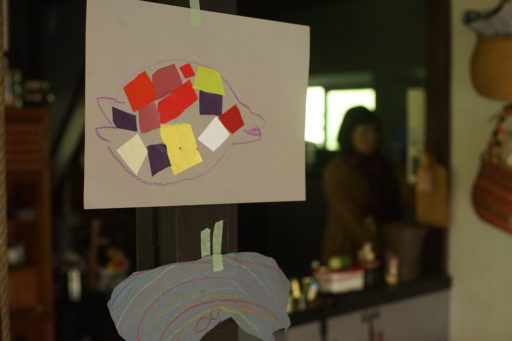
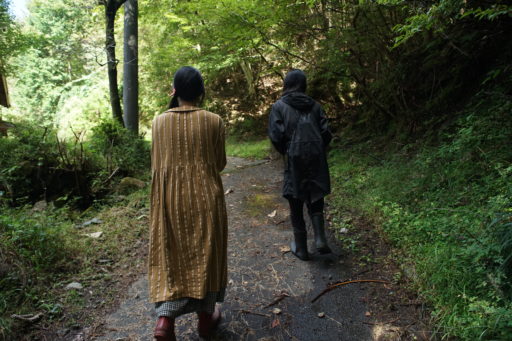
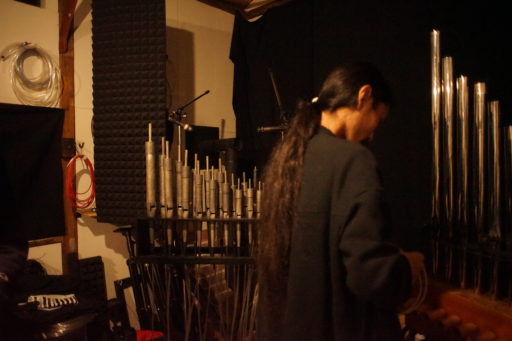
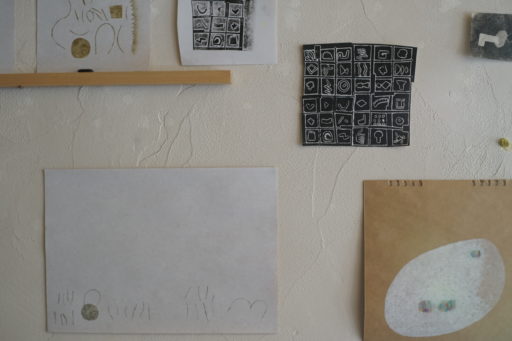

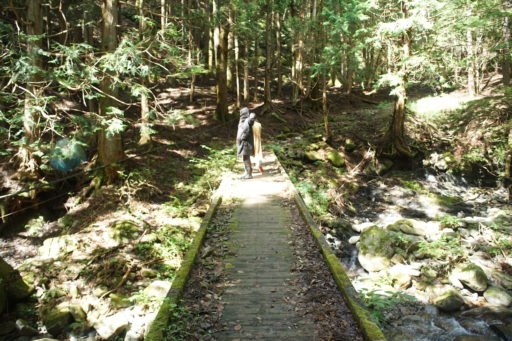
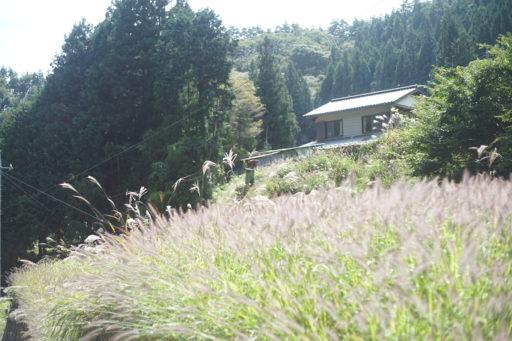
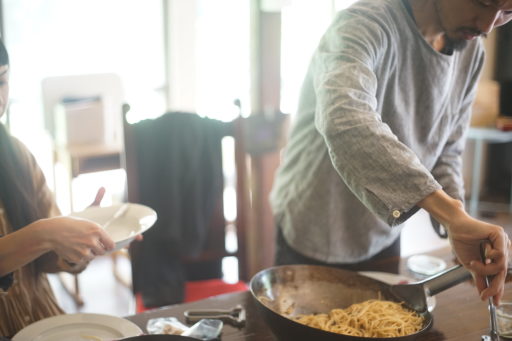
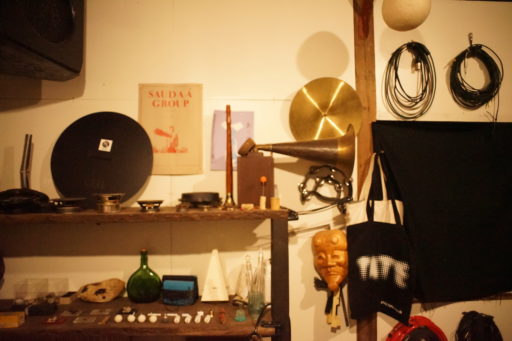
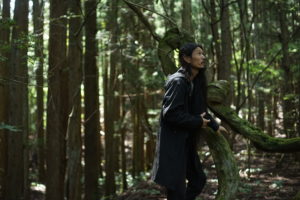
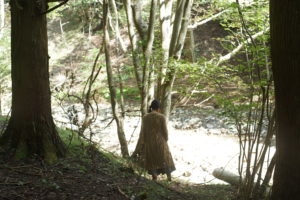
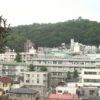

Comment